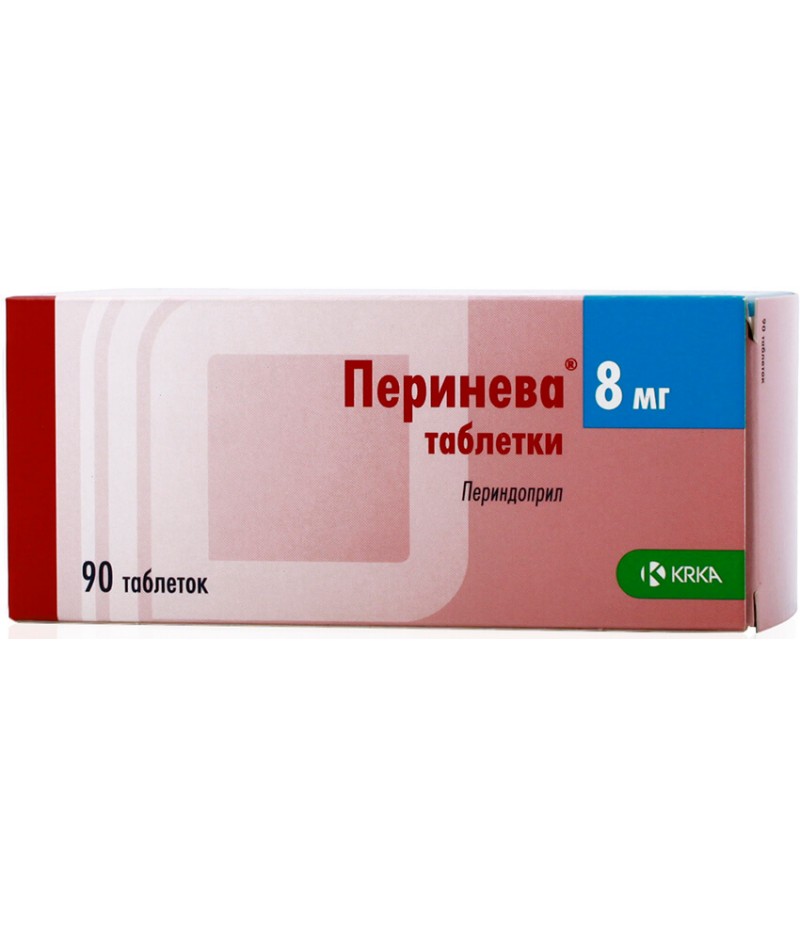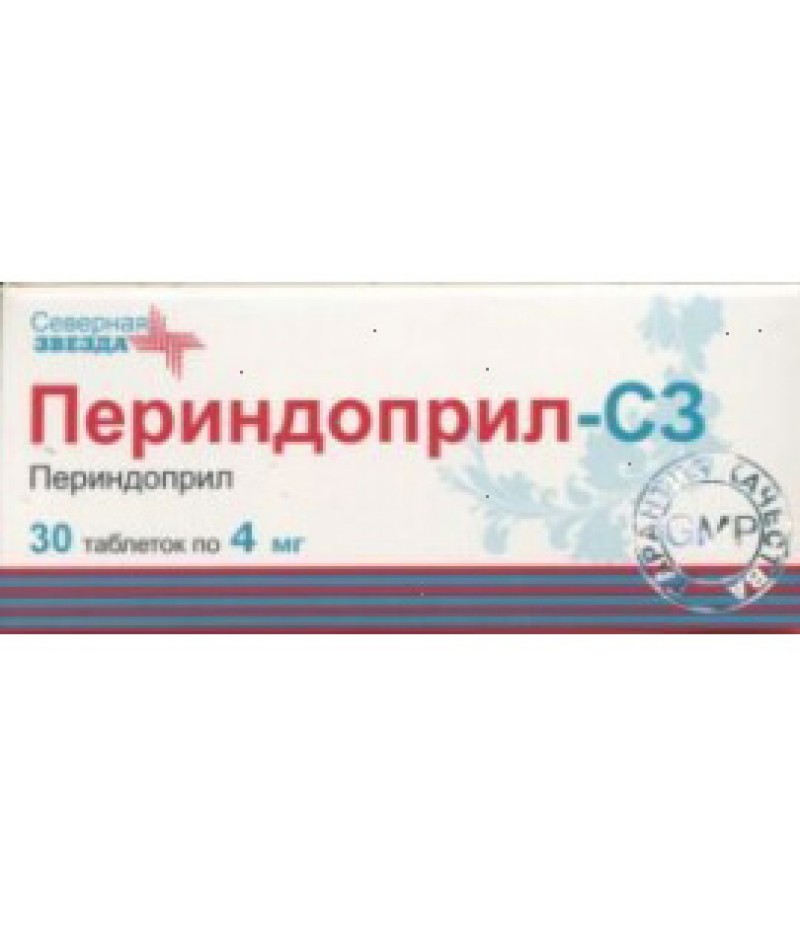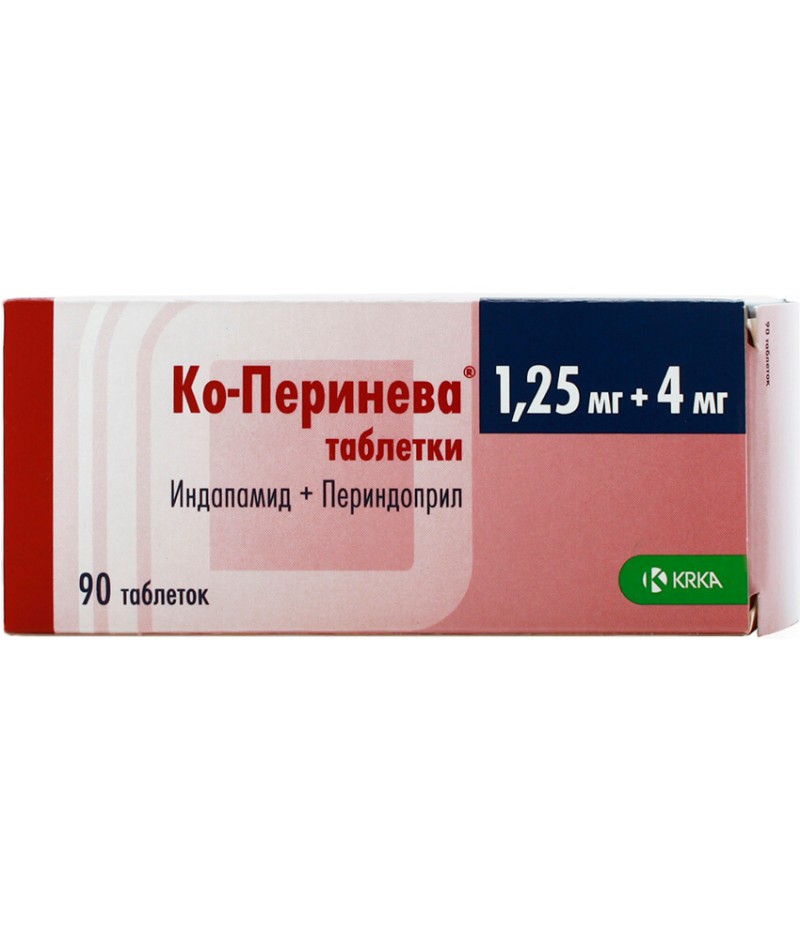Perineva tabs 8mg #90
- $50.35
- 2 or more $49.50
- 3 or more $48.80
- Availability:In Stock
Instruction for Perineva tabletsReed more and buy Perineva on this pageCompositionPerineva's medicine includes the following components: perindopril erbumine; lactose monohydrate, calcium chlori..
Tags: tabs
Instruction for Perineva tablets
Reed more and buy Perineva on this page
Composition
Perineva's medicine includes the following components:
perindopril erbumine;
lactose monohydrate, calcium chloride hexahydrate, crospovidone;
silicon dioxide colloid, MCC, magnesium stearate.
Form of issue
The drug is available in the form of round white biconvex tablets with a risk on one side of 8, 4 or 2 mg. In the blister is 10, 14 or 30 tablets.
pharmachologic effect
Perineva has antihypertensive, vasodilating and cardioprotective action.
Pharmacodynamics and pharmacokinetics
Perindopril has a therapeutic effect due to perindoprilat (active metabolite). It lowers systolic and diastolic pressure, OPSS, resulting in lower blood pressure. Peripheral blood flow is accelerated, but the pulse does not increase.
The maximum effect is manifested after taking an average of 4-6 hours and persists for 24 hours.
Arterial blood pressure decreases quite rapidly. Stabilization of pressure is observed after about a month of therapy. After cessation of treatment, withdrawal syndrome does not develop.
Increases the elasticity of the arteries, contributes to the elimination of their structural changes. Normalizes the work of the heart muscle, reduces preload and postload.
The maximum concentration of perindopril in the blood after taking is observed in an hour. It is quickly absorbed from the digestive tract. Bioavailability is 65-70%.
Simultaneous intake of food with the drug reduces the conversion of perindopril to perindoprilat, which, accordingly, reduces its bioavailability. It is excreted through the kidneys, not cumulates.
Indications for use
From what tablets Perineva? The preparation of Perineva is prescribed in the following cases:
prevention of recurrent stroke (combined therapy with Indapamide);
chronic heart failure;
arterial hypertension;
stable ischemia of the heart.
Contraindications
The drug should not be taken with:
sensitivity to any component of the drug;
glucose / galactose malabsorption syndrome;
age to 18 years;
deficiency of lactase;
angina neurotic edema in the anamnesis (angioedema, idiopathic or hereditary edema as a result of the administration of ACE inhibitors);
intolerance to galactose.
With caution, the drug is used when:
bilateral stenosis of the arteries of the kidneys;
chronic renal failure;
Renovascular hypertension;
stenosis of the artery of a single kidney;
stages of decompensation of heart failure;
hyponatremia, hypovolemia;
hyperkalemia;
cerebrovascular diseases;
hypertrophic obstructive cardiomyopathy;
after kidney transplantation;
connective tissue diseases;
general anesthesia;
diabetes mellitus;
in old age.
Side effects
As a result of taking Perineva, the following side effects may occur:
paresthesia, dizziness, headaches;
noise in ears;
impaired vision;
a significant reduction in blood pressure, angina pectoris, arrhythmias, stroke, myocardial infarction, vasculitis;
shortness of breath, bronchospasm, cough, rhinitis, eosinophilic pneumonia;
abdominal pain, nausea, dysgeusia, vomiting, constipation, diarrhea, dyspepsia, dry mouth, pancreatitis, cholestatic or cytolytic hepatitis;
itching, edema of the extremities, facial, rash, urticaria, muliform erythema;
muscle cramps;
impotence, kidney failure;
increased sweating, asthenia;
reduction of hemoglobin and hematocrit, neutropenia, leukopenia, thrombocytopenia, pancytopenia, agranulocytosis (manifested with high-dose application for a long period of time), hemolytic anemia (rarely seen in patients with deficiency of glucose-6-phosphate dehydrogenase);
increased concentration of urea and creatinine, hyperkalemia (reversible after discontinuation of the drug), hypoglycemia, increased activity of liver enzymes.
Instructions for use Perineva (Method and dosage)
The drug should be taken 1 time, in the morning, inside, before eating.
In the instructions for tablets it is noted that the dose is selected for each patient individually, depending on the severity of the disease and the response to therapy.
With arterial hypertension, Perineva's medicine can be used both in monotherapy and simultaneously with other drugs that reduce blood pressure. The initial daily dose should not exceed 4 mg. If the therapy does not work within a month, the dose can be raised to 8 mg (with normal transfer of the previous dose).
Before taking this medication, it is necessary to stop taking diuretics for at least 3 days, as the combined use of these drugs can lead to hypotension.
Elderly patients are not recommended at the beginning of the course to take a daily dose of more than 2 mg. If necessary, with normal tolerance, it can be increased to 4 mg, and then to 8 mg.
In chronic heart failure, the drug should be taken exclusively under medical supervision, it should begin with a minimum dose (2 mg). Increase to 4 mg dose can be no earlier than a week.
As a prophylactic against repeated stroke, the dose of the drug for the beginning is 2 mg. You can start taking the drug within two weeks after suffering a stroke.
The recommended dose for ischemic heart disease is 4 mg. When controlling the kidney function, after two weeks, you can increase the dose twice (8 mg).
With kidney disease, the dose of the drug is administered individually, based on the diagnosis and the degree of disturbance. It is necessary to constantly monitor the patient's condition, in particular, the level of creatinine and potassium ions in the blood.
It is not necessary to adjust the dose for liver diseases.
Overdose
In case of an overdose, the patient may experience the following symptoms: shock, kidney failure, bradycardia, a sharp decrease in blood pressure, hyponatremia, dizziness, cough, hyperkalemia, tachycardia, anxiety, hyperventilation, palpitations.
With a sharp decrease in blood pressure, the patient should assume a prone position, slightly raise his legs, as well as take measures to replenish the BCC. With a bradycardia that does not respond to therapy (in particular, anthropin), it is necessary to install a pacemaker (artificial pacemaker). From the blood flow perindopril can be removed by hemodialysis.
Interaction
Simultaneous acceptance of Perineva with diuretics can lead to arterial hypotension. Reduce the risk of its appearance can be by canceling the intake of diuretics or taking the drug at lower doses. In the future, increasing the dose of Perineva should be administered with caution.
The combination of perindopril with potassium-sparing diuretics, products and additives, as well as potassium preparations can lead to the development of hyperkalemia. They should be prescribed exclusively with hypokalemia with the utmost care, while controlling the level of ions.
Perindopril together with lithium preparations can cause lithium toxicity and increase the level of lithium in the blood, therefore it is not recommended to assign them simultaneously. If this combination is necessary, the concentration of lithium in the blood should be monitored.
Reduction of antihypertensive effect can occur as a result of Perineva's combination with NSAIDs. Also, such therapy can lead to deterioration of the kidneys. In some cases, this can lead to acute kidney failure.
Strengthen the antihypertensive effect of perindopril may be simultaneous acceptance of other means that reduce blood pressure, or vasodilators.
Hypoklikemicakie means (including, insulin) and Perineva in a joint application can cause an increase in hypoglycemic effect, right up to glycemia.
Sympathomimetics impair the therapeutic effect of perindopril, with their appointment it is necessary to monitor the effectiveness of Perineva.
Strengthen antihypertensive effect can antidipressants, neuroleptics and general anesthetics.
A combination of Perineva with nitrates, antsetilsalitsilovoy acid, beta-adrenoblockers and thrombolytic agents is possible.
Terms of sale
To buy Perineva the prescription is not required.
Storage conditions
In a dark place at a temperature of 25 ° C.
Shelf life - 3 years.
special instructions
Perindopril is not recommended to be taken concomitantly with lithium preparations, potassium-sparing diuretics and potassium-containing drugs, products and supplements.
In diabetes mellitus, the first 3 months of Perineva's administration in patients should be monitored for blood glucose levels.
When driving, you should consider the risk of such side effects as dizziness and a sharp drop in pressure.
Reviews about Perineva
Among patients, the reviews about this drug are rather contradictory. On the one hand, many note its effectiveness, on the other - the effect of taking drugs spoil side effects, in particular coughing and dizziness.



